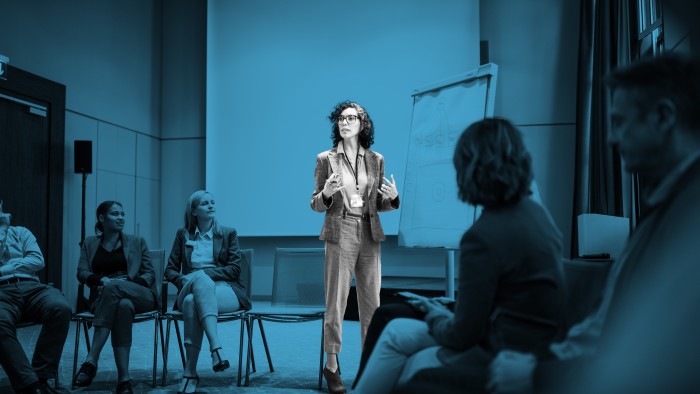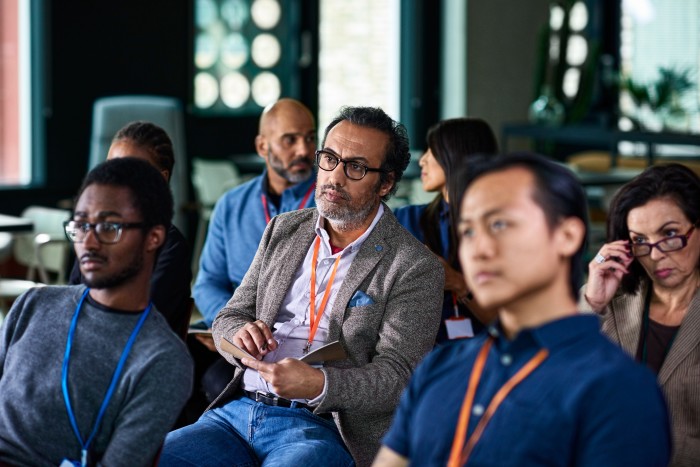Why a ‘tough legal crowd’ needs a hard sell

Roula Khalaf, Editor of the FT, selects her favourite stories in this weekly newsletter.
Ben Shillito has worked with enough lawyers to conclude: “They are quite a tough crowd.”
As head of digital legal services for Fujitsu, the Japanese information technology provider, he finds them sceptical of change, and in need of persuasion.
That obstinacy often surfaces when introducing lawyers to concepts outside those they are skilled in, Shillito finds. Nonetheless, he is on a mission to introduce more new technology, collaborative strategies, entrepreneurial thinking, and data literacy.
Shillito, himself a trained lawyer, leads a 40-strong unit tasked with persuading Fujitsu’s roughly 600 in-house counsel worldwide to embrace new technology and collaboration tools.
“We can spend a lot of time building the technology, but that’s actually, comparatively, the easiest bit,” he says. “The hardest bit is getting the adoption, the behavioural change.”
The challenge is similar across many in-house teams and big firms, where lawyers are urged to adapt to a more digital, collaborative, and entrepreneurial legal services market.
“We have to pause to think about the [size] of the cultural change required,” says Moray McLaren, co-founder of Lexington Consultants, which provides training programmes to encourage innovation at big firms and in-house departments.

Two years ago, Shillito launched a campaign to persuade Fujitsu’s in-house lawyers across the globe to provide the legal knowledge that his innovation team — of lawyers and engineers — should embed in digital automation tools. Shillito also needs the company’s lawyers to use these automated tools to collaborate more efficiently with the business side.
He reports some success, despite initial resistance. At Fujitsu, 52 per cent of the “low-complexity” legal work is automated or farmed out to lower-skill teams, saving the company $3.65mn since October 2021, he says.
To earn the trust of in-house lawyers, and soothe any fears that automation will displace them, Shillito strives for full transparency — sharing from the outset how their contributions will be used. “Once you turn people off, it’s extremely hard to get them back,” he notes.
At Hogan Lovells, lawyers have garnered praise from clients about their legal knowledge and skills, but not so much about their sales abilities, says Adam Soames, the international firm’s global head of business development and strategy. Hogan Lovells lawyers are, as a whole, “not quite as proactive as their competitors at introducing other parts of the firm to our clients”, Soames says.
To develop and polish the lawyers’ skills at pitching their own, and their colleagues’, services, Soames has focused on “desensitising” them through training, so they know that “it’s OK to reach out to clients in between matters”. Soames launched his classes last year, shortly after Miguel Zaldivar joined as chief executive.
To “close the gap” between Hogan Lovells and faster-growing rivals, more of its lawyers must behave as if they are “a little bit hungrier”, Soames argues.
His team worked with the firms’ most successful dealmakers to learn “their habits and behaviours” and used those as a blueprint for his curriculum, he says.
Since rolling out the training, Hogan Lovells has substantially raised its win rate for competitive pitches, Soames says. The firm offered the initial classes exclusively to partners but, then, senior associates requested the training and, now, almost half the firm’s lawyers have attended, he adds.
At Dentons, Andrea Miskolczi, director of innovation in Europe, is working on training to help lawyers increase their data literacy. She has co-developed an interactive lecture course with in-house lawyers at client Mercedes-Benz and with Gábor Békés, an assistant professor in the department of economics and business at the Central European University in Budapest.
Miskolczi and her fellow course designers deliberately avoided using legal cases for in-class examples. They thought it would help sustain engagement with the material if they took a more general approach. A specific legal topic would limit the appeal if it related only to some participants’ legal speciality, they anticipated.
However, the two dozen Denton and Mercedes lawyers who took part in the initial training in June, said there was too little legal data in the examples, Miskolczi reports. She plans in future to explain “in much more detail, why we don’t use legal cases”.
For Jean-Philipe Doho, legal innovation manager at Paris-based video game maker Ubisoft, the challenge was different. In 2020, senior executives asked him to eliminate the “friction between what the business side thought the legal side was supposed to do, and what the legal side expected to do”. Doho says this mandate required him to push Ubisoft’s 70 or so in-house lawyers out of their comfort zones.
His team asks the lawyers to channel their “inner video game maker” and help to design interactive tools that help Ubisoft’s employees and customers to participate in the automation of legal tasks.
Doho, a lawyer by training, recently attended a 12-month design programme at ENSCI Les Ateliers in Paris. He wants lawyers to serve as “the voices of innovation” in the company and to persuade their colleagues and customers to use the new tools.
Ubisoft has now automated parts of the execution of non-disclosure and licensing agreements and developed an online exam to help assess the legal knowledge of each business team. And the relationship with other Ubisoft employees who handle operations has been transformed: “Things go faster,” Doho says.
These days, other Ubisoft employees and managers “expect things to be a bit different,” he says. “Our job was to make sure everyone is going in the same direction.”
Case study in best practice: Learning and development
Researched, compiled and ranked by RSGI. ‘Winner’ indicates the organisation won an FT Innovative Lawyers 2022 award.
Learning and development
Winner: Hogan Lovells
Originality: 7 Leadership: 9 Impact: 9 — Total 25
The firm has launched several initiatives to encourage staff to be more entrepreneurial. These include more structured training, a rewards programme for winning new business, and a fresh approach to pitching. When competing for particularly important work, the pitch team is coached by one of the firm’s most successful partners. Training has been delivered to about 1,200 people in the first year and the success rate of pitching doubled between 2019 and 2021.
Standout
Addleshaw Goddard
O: 6 L: 8 I: 8 — Total 22
Partners and managers are training as coaches through an externally validated course. Those who complete the course offer to coach colleagues in any role or seniority level in the firm as part of a development programme. There is a higher retention rate among those involved in the programme.

Bird & Bird
O: 6 L: 8 I: 8 — Total 22
The firm now offers one global, consistent training scheme for all roles and seniority levels, having previously run development programmes in half a dozen of its 31 offices. To help deliver this, the firm launched a learning management system that provides the courses and collects feedback. Since 2021, more than 1,000 people have attended sessions.
Commended
Dentons
O: 7 L: 7 I: 7 — Total 21
The firm is co-developing a course in data literacy for lawyers with the in-house legal team at carmaker Mercedes-Benz. The course introduces lawyers to data science and analytics and how these relate to the delivery of legal services.
Luther
O: 7 L: 7 I: 6 — Total 20
In collaboration with WHU-Otto Beisheim business school, the firm is offering a course to help its lawyers and clients have a better understanding of new technologies.

Sorainen
O: 6 L: 7 I: 6 — Total 19
The Baltics law firm has launched its own learning management system, offering both external and internal training on a single platform.
Travers Smith
O: 6 L: 7 I: 6 — Total 19
Partners at the firm completed a psychometric test to assess their approach to collaboration and encourage better co-operation.
Comments